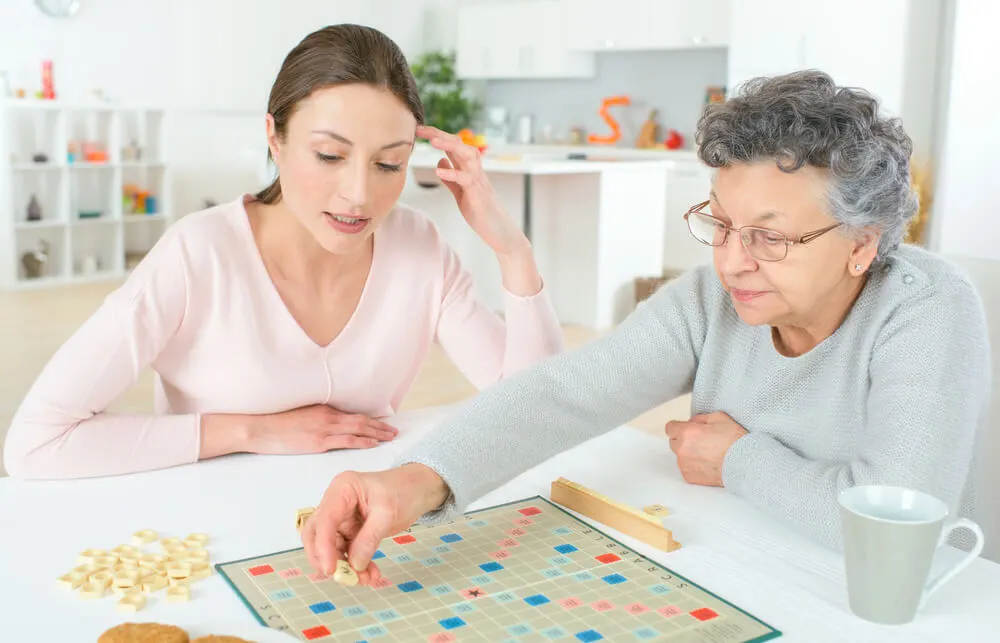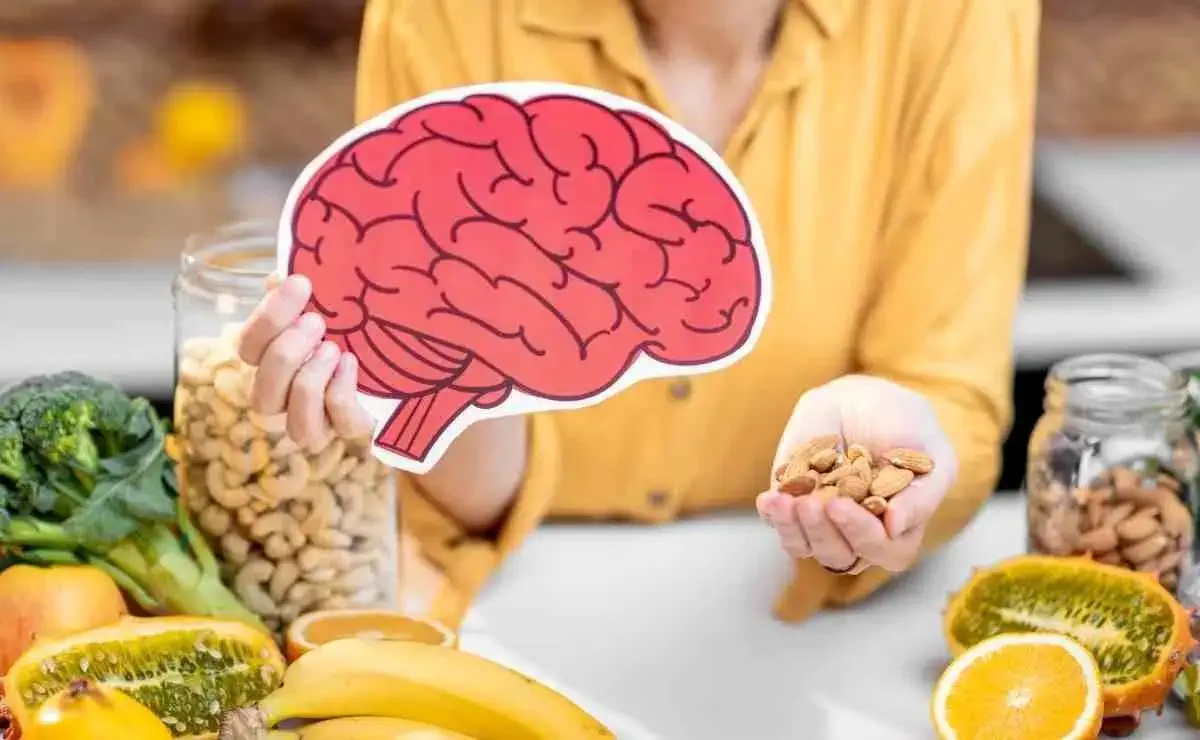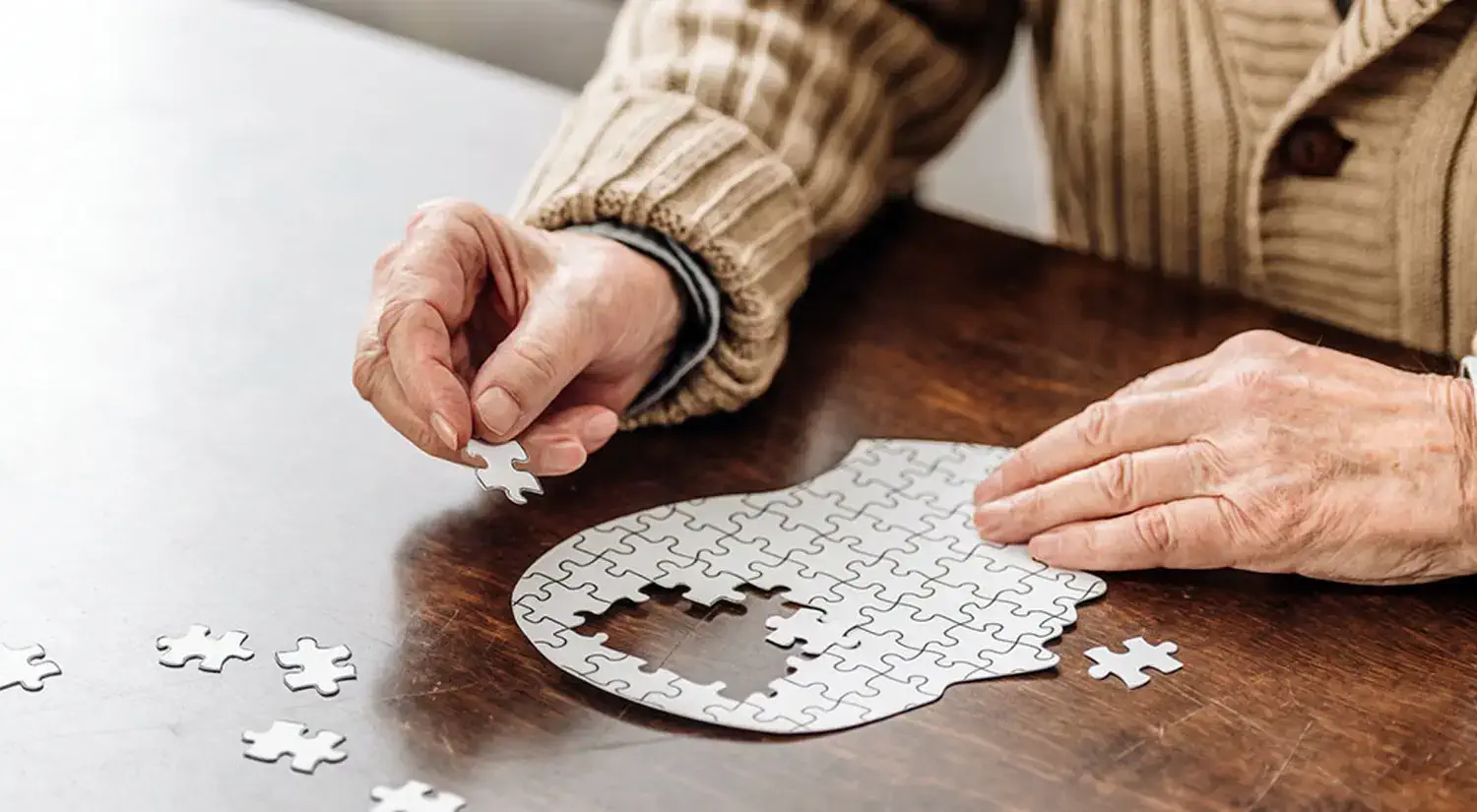
8 Latest Memory Exercises for Elderly with Dementia
As time goes by and we get older, our mental abilities, like our physical bodies, require care and strengthening. But how can we help the elderly to strengthen their memory and prevent dementia? How can we prevent Alzheimer’s in old age? Alzheimer’s or dementia is a disease that is often seen in the elderly and is caused by an unhealthy lifestyle, poor diet, and reduced mental and physical activity. However, there are memory exercises for elderly with dementia that can help strengthen brain function and reduce the risk of developing this disease.
In this blog from humanhealthmag, we will introduce you to simple memory exercises for dementia to prevent Alzheimer’s and scientific strategies to prevent Alzheimer’s and promote healthy aging. The exercises we will introduce below will improve the cognitive function of your elderly loved ones by stimulating the brain and nervous system, and increase their quality of life during this period. These simple methods and strategies and dementia care for elderly quality of life will help keep the memory of the elderly as vibrant and dynamic as in their youth. If you want to have an active mind and a strong memory in old age, please add these exercises to your daily routine.
Who is Most Susceptible to Alzheimer’s Disease?
Before introducing memory exercises for elderly with dementia, it is best to know that Alzheimer’s usually begins mildly and gradually worsens over time. This disease has no specific cure, so the best solution is to prevent its onset. Before examining techniques to prevent Alzheimer’s, it is better to know who is susceptible to this disease. Dementia is not a natural part of aging, and its onset may be due to one of the following reasons:
- Elderly individuals who did not have a proper diet in their youth are one of the main groups susceptible to this type of cognitive disease. If a person’s diet does not adequately provide foods containing antioxidants and vitamin E, the likelihood of developing Alzheimer’s disease increases.
- A family history of Alzheimer’s disease indicates that the disease may be genetic. Some individuals develop this disease due to having a gene that predisposes them to Alzheimer’s.
- Women have a higher susceptibility to Alzheimer’s disease.
- Individuals who have had high blood pressure for a long time are susceptible to this disease.
- Individuals who were morbidly obese in middle age are susceptible to Alzheimer’s.
- Individuals who have previously suffered head trauma or concussion for any reason are susceptible cases of dementia.
- Individuals who have not used techniques to prevent Alzheimer’s. These techniques are quite simple and cost-free; therefore, trying them to maintain health will not be without benefit.

Reasons for Increased Forgetfulness in the Elderly
With increasing age, natural changes occur in the brain that may lead to memory decline and reduced cognitive abilities, and can also lead to dementia. For this reason, strengthening the brain and memory in old age is particularly important. So that with memory exercises for elderly with dementia, individuals can lead more active lives and prevent diseases such as Alzheimer’s. One of the most important factors that may cause forgetfulness and memory impairment in older adults is the natural biological changes that occur in the brain with age. Over time, brain cells may become damaged or die, which reduces the brain’s ability to store and retrieve information.
Also, reduced blood flow to the brain, damage to nerve cells, and decreased levels of effective chemicals such as dopamine and serotonin in the transmission of nerve messages, as well as changes in brain structure, can play a role in this process and lead to decreased memory function. In addition, other reasons such as chronic diseases (such as Alzheimer’s and Parkinson’s), stress, depression, poor nutrition, lack of physical activity, and lack of sleep are also effective factors in forgetfulness and reduced mental abilities in the elderly and can exacerbate memory problems in older adults.
8 of the Latest Memory Exercises for Elderly with Dementia
Strengthening memory in the elderly is a topic of particular importance due to increasing age and natural changes in brain function. In this regard, new methods have been introduced to improve memory, which can help seniors enhance their quality of life. Below, we examine eight of the latest methods for enhancing memory in the elderly:
1. Non-Invasive Brain Stimulation Devices
Non-invasive brain stimulation devices, such as TMS (Transcranial Magnetic Stimulation) and tDCS (Transcranial Direct Current Stimulation), are increasingly used in research and treatments related to cognitive disorders and memory enhancement in the elderly. These devices stimulate neuron activity in specific brain regions using magnetic fields or mild electrical currents. Research has shown that these methods can help improve memory, attention, and cognitive function in the elderly, and even reduce the symptoms of dementia in some cases.
The use of these techniques as a complementary treatment can help seniors improve their quality of life. These devices usually have no serious side effects and can be used in clinical or even home settings. However, consulting with a specialist physician before starting treatment with these devices is essential to ensure that these methods are appropriate and safe.

2. Brain Training Programs and Mobile ApplicationsBrain training programs and mobile applications serve as effective tools for strengthening memory and cognitive abilities in the elderly. These programs typically include a variety of games and exercises designed to challenge the mind and strengthen skills such as memory, concentration, and problem-solving. Many of these applications are available for free or at a low cost and can be easily installed on smartphones.
These programs are not only entertaining but can also help seniors maintain their cognitive skills and prevent dementia. By regularly performing these memory exercises for elderly with dementia, seniors can experience a sense of success and progress, which in itself is a factor in increasing self-confidence and motivation. Additionally, some of these programs allow for competition with friends or other users, which can also strengthen social interaction.
3. Digital Puzzles and Brain Games
One of the best and simplest memory exercises for elderly with dementia is playing games that challenge the brain and strengthen cognitive function. Alzheimer’s prevention games, by activating different parts of the brain, help strengthen memory, focus, and problem-solving skills, and slow down the process of cognitive decline.
Digital brain games are among the Best Brain and Memory Games for Dementia and are beneficial for enhancing memory in the elderly. These games typically involve challenges that require logical thinking, problem-solving, and creativity. In addition to strengthening memory, digital brain games provide an opportunity for entertainment and recreation. Many of these games have different difficulty levels, allowing for gradual progress for players. Also, some games have the ability to compete online with others, which can increase the social interaction of seniors and strengthen their sense of belonging to a community.

Chess is also one of the most effective games for preventing Alzheimer’s. This game requires planning, decision-making, and forecasting, all of which activate brain neurons and strengthen memory. Sudoku and crossword puzzles require logical thinking and stimulate different parts of the brain, consequently reducing the likelihood of Alzheimer’s.
Picture puzzles, Lego, and jigsaw puzzles, in addition to strengthening memory, improve problem-solving skills and increase focus. Therefore, games like chess, Sudoku, and picture puzzles help seniors strengthen their cognitive skills and maintain their memory. Research has shown that participating in such activities for older adults with dementia can reduce the risk of developing dementia.
Card games and board games like bridge, poker, Parcheesi (Ludo), and backgammon can keep the mind active and prevent cognitive decline. In addition to entertainment, these types of games also help with the coordination of the mind and hand movements. Video games specifically designed to enhance memory, such as memory matching games, increase the speed of information processing and are effective in preventing Alzheimer’s and strengthening memory. Games that require quick reactions, such as Tetris or concentration games, can keep the mind active.
4. Virtual Reality (VR)
Virtual reality (VR) is an innovative technology that has recently gained attention in the field of brain exercises for elderly with dementia. Using VR headsets, users can enter virtual worlds and engage in simulated environments that include mental exercises and cognitive challenges. This experience is not only engaging but also stimulates the brain and increases concentration.
Research has shown that virtual reality can have a positive impact on short-term and long-term memory. Activities in virtual environments also increase social interactions, as seniors can connect with others in the virtual world. Additionally, VR provides an opportunity to learn new skills in a safe environment, which can help increase the self-confidence of the elderly.
5. Dietary Supplements and Nootropics
Dietary supplements and nootropics (substances that enhance cognitive function) have been considered as options and memory exercises for elderly with dementia. Some of these supplements include nutrients such as omega-3s, glucosamine, antioxidants, and specific types of vitamins, all of which play an important role in brain health. Research has shown that regular consumption of these supplements may improve cognitive function.
However, it is important to consult a doctor before starting any dietary supplement. Some supplements may interact with other medications or cause side effects. Also, choosing high-quality supplements is crucial to ensure that they contain actual effective ingredients.
6. Meditation and Deep Breathing Techniques
Meditation and deep breathing techniques are recognized as effective methods for reducing stress and enhancing memory in the elderly. Meditation, by focusing on breathing or a specific point, helps individuals calm their minds and have greater attention. Research has shown that regular meditation can increase the volume of gray matter in the brain, which is related to memory and learning.
Deep breathing is another technique that has a positive effect on cognitive function. By reducing stress levels through deep breathing, individuals will be able to concentrate better and process information more effectively. Combining meditation with breathing exercises not only calms the mind but also increases positive energy.

7. Balanced and Brain-Friendly Nutrition
Balanced nutrition is a key factor in maintaining brain health in the elderly. Consuming foods rich in antioxidants, omega-3 fatty acids, fiber, and various minerals plays an important role in enhancing memory in older adults. Foods such as fatty fish (like salmon), nuts, berries, dark leafy green vegetables, and whole grains are among the best options for brain nutrition.
A proper diet not only maintains the physical health of the elderly but also has a direct impact on their cognitive function. Studies have shown that people who have a balanced diet are less likely to experience memory problems compared to those with poor nutrition; therefore, paying attention to easy recipes for seniors with dementia and their proper nutrition should be an integral part of the daily routine of the elderly.
8. Physical Exercises and Specific Movements
Regular physical activity is one of the most effective ways to enhance memory in the elderly. This memory exercises for elderly with dementia not only promotes physical health but also has a positive impact on cognitive function. Exercises such as walking, cycling, or swimming increase blood flow to the brain and facilitate better oxygenation. Walking increases blood flow, improves brain function, and promotes the release of hormones that are beneficial for the health of nerve cells. 30 minutes of daily walking can significantly reduce the risk of developing Alzheimer’s.
Swimming and water exercises, in addition to increasing respiratory capacity and strengthening muscles, help improve blood circulation in the brain. Swimming, as a low-impact exercise, is an ideal option for the elderly and can help prevent Alzheimer’s in older adults. Activities such as dancing, chess, tennis, and learning new skills increase brain plasticity and are effective in preventing Alzheimer’s. These exercises engage both the mind and body simultaneously.
In addition to general exercises, specific movements such as yoga or Tai Chi are also very beneficial. These types of exercises, in addition to strengthening the body, have a positive effect on mental relaxation and reduce anxiety and stress. Combining physical activity with mental exercises such as meditation or brain games can yield very good results for maintaining brain health in the elderly.
Yoga exercises, ad exercises such as Tai Chi and corrective movements focus on balance and body coordination. These exercises in addition to improving body flexibility, have a tremendous effect on reducing stress and enhancing memory. Yoga postures, combined with breathing exercises and meditation, lead to a reduction in neural inflammation and improved cognitive function.
26 Top Beneficial Techniques and Exercises for Brain Improving in Elderly with Dementia
In addition to a healthy diet and lifestyle, it is best to incorporate exercises to prevent Alzheimer’s. These exercises are a type of mental workout to strengthen the brain. By doing these exercises, you strengthen the connections between brain neurons and, as a result, protect yourself from the risk of cognitive and brain diseases such as dementia. Some techniques for preventing Alzheimer’s include:

- Doing everyday tasks with your non-dominant hand. For example, you can try writing, brushing your teeth, or eating with your non-dominant hand.
- Wearing your watch on your right wrist. This technique helps significantly in preventing Alzheimer’s by activating the other hemisphere of the brain.
- Reading words and sentences backward.
- Choosing different routes to go to work, university, or home.
- Try changing your regular hangouts every so often.
- Think more about your beliefs and challenge them. Sometimes beliefs create mental blocks that lead to mental problems like Alzheimer’s.
- Try to learn new things and new skills every so often; something that has no connection to your current job.
- Sometimes keep your mobile phone away from you. Set aside times for yourself when you have no communication devices with you.
- Try memorizing a few lines of poetry each day.
- Find a safe place away from traffic and walk backward.
- Call or visit people you haven’t been in contact with for a long time.
- Solve puzzles or crosswords. Crossword puzzles or Sudoku can be one of the best techniques for preventing Alzheimer’s.
- Read books to help your increased learning aid in preventing Alzheimer’s.
- Play with children. Direct interaction with the world of children can be an excellent technique for preventing Alzheimer’s.
- Have a regular and aerobic exercise program.
- Gardening and crafts for older adults with dementia are effective techniques in preventing Alzheimer’s.
- Use some assistive programs to enhance memory and prevent Alzheimer’s. Applications like Lumosity, CleverMind, Brain Trainer, and the Dakim game are effective tools for this.
- Listening to calming and soothing music is a very effective technique in preventing Alzheimer’s.
- Learn new cooking styles.
- Learn new languages.
- Use verifiable counting guess methods. For example, guess the number of steps from where you are standing to a specific point and start walking and counting.
- When watching a movie on your phone or computer, stop it before the end and imagine the ending in your mind.
- Use different color combinations in your clothing.
- Artistic activities such as painting or coloring are very influential techniques in preventing Alzheimer’s.
- Try not to use a calculator for everyday calculations.
- Expand your social relationships and try to make many friends.
Each of the Alzheimer’s prevention techniques mentioned above can be very effective. Also, you don’t need to do them all at once. Instead, you can start with whichever one you are comfortable with and gradually increase the number of these exercises.
Concluding Remarks
How to deal with elderly forgetfulness? In this article, we discussed latest memory exercises for elderly with dementia. Strengthening memory in the elderly can be achieved through several effective methods. Non-invasive brain stimulation devices, brain training programs and mobile applications, and digital brain games help challenge the mind and strengthen cognitive skills. Additionally, virtual reality (VR) technology increases social interaction by creating simulated environments. Dietary supplements and nootropics can also help improve cognitive function, but they should be used under medical supervision.
Meditation and deep breathing techniques help reduce stress, increase concentration, and improve blood flow in the brain. A balanced diet rich in antioxidants and omega-3 fatty acids is essential for maintaining brain health. Finally, regular physical exercise not only promotes physical health but also has a positive impact on cognitive function. These methods help older adults with dementia improve their quality of life and make greater use of their memory power.
We’ve shared our thoughts and now it’s YOUR turn! Please share your insights in the comments, and let’s start a meaningful discussion that will help others, too!

Frequently Asked Questions
Why Does Memory Decline in the Elderly?
With increasing age, factors such as reduced blood flow to the brain, changes in brain structure, and decreased neuron activity lead to memory impairment.
How Can Memory be Strengthened Throughout the Day?
Reading books, solving problems, learning new languages, playing brain games, physical exercise, and getting enough sleep are among the ways that can help improve memory throughout the day. Using memory enhancement apps is also beneficial.
Is Memory Enhancement Possible?
Yes, research shows that memory can be strengthened by using various techniques such as mental exercises, proper nutrition, sufficient sleep, and physical activities.
